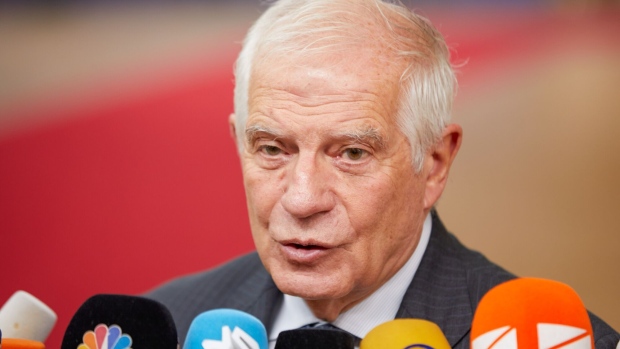Jan 22, 2024
EU Says Israel’s Attack on Hamas ‘Seeding Hate’ for Generations
, Bloomberg News

(Bloomberg) -- Israel’s bombardment of Gaza is failing to root out Hamas and is “seeding hate” for years to come, the European Union’s foreign policy chief said.
Israel has been striking the Hamas-run enclave after the group carried out a deadly Oct. 7 incursion and took scores of people hostage. Prime Minister Benjamin Netanyahu has come under mounting international pressure to end the operations against Hamas, which is designated a terrorist group by the US and EU, and for rebuffing US and Arab-backed initiatives for post-war Gaza.
Instead of destroying Hamas, Israel is “seeding the hate for generations” with its retaliatory strikes on Gaza, Josep Borrell told reporters Monday ahead of a meeting of EU foreign ministers in Brussels. He urged parties to start thinking more concretely about a two-state peace process.
Israel, which has said that the only way to guarantee the security of its citizens is to eliminate Hamas entirely, says it accomplished much of what it set out to do. It has killed some of the group’s key leaders and says it has degraded the group in northern Gaza, although fighting continues.
Israel’s foreign minister, Israel Katz, who traveled to Brussels for the meeting, said he was there to discuss efforts to free hostages held by Hamas in Gaza and how to dismantle the group completely.
Netanyahu said last week Israel would insist on keeping security control of both Gaza and the West Bank, which Palestinians claim as a future state. Those comments prompted a rebuke from the US State Department, while UK Defense Secretary Grant Shapps told the BBC on Sunday it was “very disappointing.”
The sentiments were echoed by EU foreign ministers on Monday ahead of a meeting in Brussels, where they will be joined throughout the day by the top envoys from Israel, Saudi Arabia, Jordan and Egypt, as well as the Palestinian Authority and the Arab League.
Luxembourg’s Foreign Minister Xavier Bettel said if the Israelis don’t think a two-state solution is an answer, then “they’re very isolated.”
“The support for Israel is at risk to shrink very quickly to a very low level,” Bettel said, adding it’s in their interest to come to the table.
The EU’s foreign policy arm has proposed ideas about a two-state solution to the bloc’s member states, including how countries might be able to impose conditions in the future to safeguard that solution, according to a senior EU official.
Israel rebuffed a settlement for postwar Gaza proposed by five Arab nations with US backing. The framework being pushed by the Gulf states of Saudi Arabia, the United Arab Emirates and Qatar, together with Israel’s neighbors Egypt and Jordan, offers aid on condition the Israeli government works toward Palestinian statehood.
Asked about the Israeli government’s rejection of a Palestinian state, Borrell stressed the solution has been approved by the United Nations and the international community.
“So they don’t agree, we have to discuss,” Borrell said. “Which are the other solutions they have in mind? To make all the Palestinians leave? To kill them?”
Hamas killed 1,200 people and abducted 240 others in its Oct. 7 incursion into southern Israel. Israel then launched strikes and a ground invasion of Gaza, where authorities in the Hamas-run territory say more than 25,000 people have been killed. In mid-December the World Bank estimated Israeli bombardment had damaged or destroyed over 60% of Gaza’s infrastructure.
Belgian Foreign Minister Hadja Lahbib said her country, which holds the EU’s rotating presidency, planned to organize a peace conference in Brussels in the near future with the hopes of “restarting political dialog.”
EU ministers are discussing a peace conference that would be convened by the EU, Egypt, Jordan, Saudi Arabia, the League of Arab States and, perhaps, the US, according to a document seen by Bloomberg prepared ahead of Monday’s meeting of foreign ministers.
--With assistance from Maria Tadeo.
(Adds details of proposed peace conference in final paragraph)
©2024 Bloomberg L.P.








